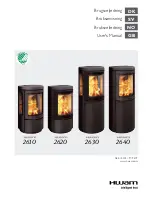
August 3, 2015
7038-206E
11
5700 STEP TOP
4
Chimney Systems
NOTE: I
n Canada when using a factory-built chimney it must be
safety listed,
Type UL103 HT (2100
o
F) CLASS “A”
or conform-
ing to
CAN/ULC-S629M, STANDARD FOR 650
o
C FACTO-
RY-BUILT CHIMNEYS.
A. Venting Systems
The venting system consists of:
• A chimney connector (also known as fl ue or stove pipe)
• A
chimney
• Thimble
These get extremely hot during use. Temperatures inside
the chimney may exceed 2000
F (1100
C) in the event of a
creosote fi re.
To protect against the possibility of a house fi re:
• Chimney connector and chimney
must be properly
installed and maintained.
•
An approved thimble must be used when a connection is
made through a combustible wall to a chimney.
• A chimney support package must be used when a
connection is made through the ceiling to a factory built
chimney.
• An approved thimble and chimney support package are
absolutely necessary
to provide safe clearances to
combustible wall and
ceiling material.
Thimble
A thimble is a manufactured or site-constructed device
installed in combustible walls through which the chimney
connector passes to the chimney.
• It is intended to keep the walls from igniting.
• Site constructed thimbles must meet NFPA 211 Standards.
• Factory-built must be suitable for use with selected
chimney and meet UL103 Type HT Standards.
• Follow instructions provided by the manufacturer for
manufactured thimbles for masonry chimney and factory-
built chimneys.
Air Clearances
• Masonry chimney clearance must meet NFPA 211 mini-
mum requirement of 2 inches (51mm) to sheet metal sup-
ports and combustibles.
• Minimum of 1 inch (25mm) clearance around the chim-
ney connector.
• Top of wall opening is a minimum of 13-1/2 inches
(343mm) from ceiling or 4-1/2 inches (114mm) below
minimum clearance specifi ed by chimney connector
manufacturer. NFPA 211 minimum vertical clearance of
18 inches (457mm) from chimney connector and ceiling
or minimum recommended by chimney connector manu-
facturer.
Figure 11.1.
Instructions:
1. Open inside wall at proper height for the chimney con-
nector to entry the masonry chimney.
Figure 11.1
2. Entry hole to masonry chimney must be lined with an 8
inch (203mm) minimum diameter clay liner, or equiva-
lent, secured with refractory mortar.
3. Construct a 17 inch x 17 inch (432mm x 432mm) outside
dimension frame from 2 x 2 framing lumber to fi t into wall
opening. Inside opening of frame should be no less than
14 inch x 14 inch (356mm x 356mm).
Figure 11.1.
4. Attach the wall spacer to the chimney side of the frame.
5. Nail the frame into the wall opening. The spacer should
be on the chimney side.
6. Insert the section of the solid insulated chimney into the
outer wall of the masonry chimney.
7. Tightly secure the length of the solid insulated chimney
with the wall band to the masonry chimney.
8. Insert a section of chimney connector into the chimney.
Make sure it does not protrude past the edge of the clay
chimney liner inside the chimney.
9. Seal the end of the chimney connector to the clay liner
with refractory mortar.
10. Install trim collar around the sold pack chimney section.
Figure 11.1
1.5”
1.0”
2.0”
2.0”
1.5”
14.0” ID
17.0” OD
ceiling
Minimum18.0”
NFPA 211
13.5” below ceiling to top
of opening
1.0”
8.0”
1.5 2x2 framing stud
2.0 min air clearance
1.0 min air clearance
4.5
or top of opening is a min.of
4.5” below min.clearance
specified by connector mfg.
Center of Hole
Thimble
C
L
C
L
Wall
Include depth
of hearth pad












































